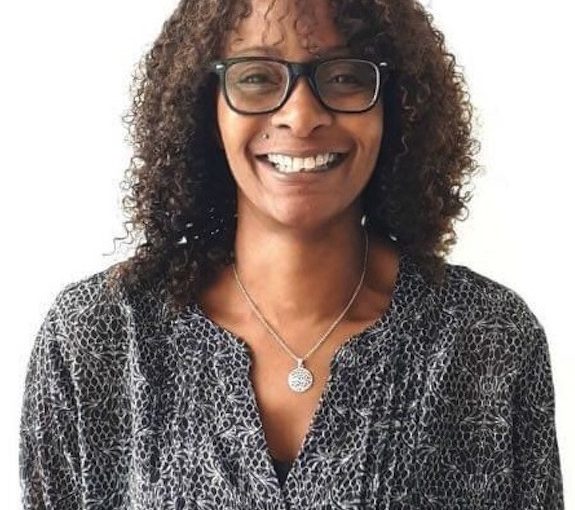Rivka Campbell, co-founder of Jews of Colour Canada. (PR photo)
On Jan. 9, Rivka Campbell, co-founder of Jews of Colour Canada, spoke on the topic Harmony in a Divided Identity: A Minority Within a Minority, the third Zoom talk in Kolot Mayim Reform Temple’s 2021-22 Building Bridges lecture series.
A Jew of Jamaican descent, Campbell seeks to create a sense of community among Jews of Colour in Canada. At the same time, she works to establish dialogue with mainstream Jewish organizations and to provide a better understanding of Jewish diversity and the experiences of Jews of Colour.
Her opening remarks focused on what she labeled “the question” – that is, the unwelcoming, uninviting and off-putting line of inquiry Jews of Colour often confront when entering Jewish spaces. Though born and raised in Toronto, Campbell, like other Jews of Colour, is often asked, “Where are you from?” – the implication being that she is not Jewish.
This question, she points out, is alienating from the start and is not the kind of introduction that Jews of Ashkenazi backgrounds ordinarily face when, say, entering a synagogue.
A decisive period for Campbell occurred after getting married and starting a family. At the time, she wanted to introduce her children to their Jewish roots so that they could understand and appreciate every aspect of who they are.
“We leaped into the community with the assumption that I am a Jew and that this should be a non-issue. I am going to go to synagogue, put my kids in Hebrew school and just do stuff. I was wrong. What I didn’t reflect on was that I did not meet the stereotype, if you will, of what a Jew looks like, and it never occurred to me because I am Jewish, what’s the big deal? And I realized that for some people it was.”
The questions and comments would come even before a hello – Are you Jewish? How are you Jewish? But your last name isn’t Jewish.
“If I am a new face, then fine, we should welcome new faces. But the way to welcome new faces is with ‘Shabbat Shalom. My name is So-and-So, what’s your name? Here’s where we keep our siddurim.’ Welcome me first and the rest will flow naturally,” Campbell said.
She referred to these episodes, when she is singled out and her Jewishness is openly questioned, as “microaggressions.”
“Microaggressions are like mosquito bites at a summer camp. You might spray yourself and take other measures to prevent bites. Nothing works, so you spray yourself more and wear long sleeves and still nothing. After many efforts and layers, you finally say, ‘I can’t do this any longer,’ and you remove yourself from the place where the mosquitoes are,” she said.
For Campbell, there also have been more repugnant full-on aggressions, including having the derogatory term “Schvartze” directed at her.
“Would you continue to want to put yourself in that position? I have met and spoken to quite a few Jews of Colour who have said, ‘I am done. I can’t take it anymore.’ They do not want to subject themselves or their children to that kind of treatment. If we say there is no racism in our community, then we are fooling ourselves. All of us should feel they belong,” she said.
Campbell had a very good experience during an extended stay in Israel, where she met Jews from myriad backgrounds. In Israel, she did not feel she had to explain who she was and did not encounter the same questions she is asked in Jewish spaces in Canada. That trip caused her to realize that the Canadian Jewish community could do better and led her to start Jews of Colour Canada.
Things changed dramatically in May 2020 after the murder of George Floyd in Minneapolis, which, to Campbell, symbolized the banality of evil.
“That event made me not give a hoot whether people were comfortable or not with what I say because, until we are all uncomfortable, there won’t be change,” she said. “It really flipped the way I felt about diversity and the work that needs to be done. And that is where we sit today. And I see us as a community doing the work – we are listening and not just hearing what people are saying. You fix your own house first before you fix anyone else’s. And you cannot rest on the laurels of others, such as Martin Luther King Jr. and Rabbi Abraham Joshua Heschel.”
Campbell is the executive director at Beit Rayim Synagogue in Vaughan, Ont., and a board member of ADRABA, Toronto’s first 21st-century Jewish high school. She also hosts the CJN podcast Rivkush, which focuses on diversity, Israel and other Jewish topics. She is the sole Canadian recipient of the inaugural JewV’Nation Fellowship from the Union for Reform Judaism. For more information, visit jewsofcolour.ca.
The next speaker in Kolot Mayim’s Building Bridges series is, on Feb. 6, poet, author, literary scholar and internationally recognized speaker on transgender issues Joy Ladin on the topic of Jonah, God and Other Strangers: Reading the Torah from a Transgender Perspective. On Feb. 13, Reverend Hazan Daniel Benlolo, cantor, rabbi and founder of the Montreal Shira Choir for special needs adults, presents The Power of Music. To register for either or both talks, visit kolotmayimreformtemple.com.
Sam Margolis has written for the Globe and Mail, the National Post, UPI and MSNBC.

